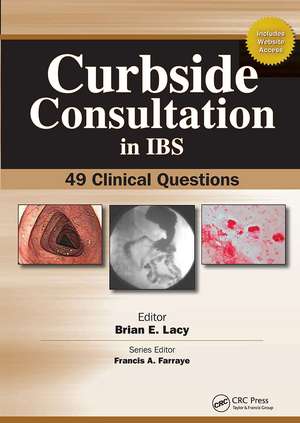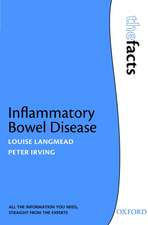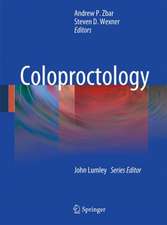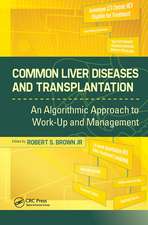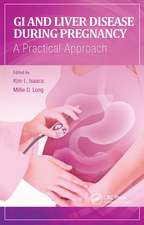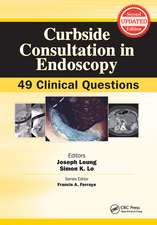Curbside Consultation in IBS: 49 Clinical Questions: Curbside Consultation in Gastroenterology
Autor Brian Lacyen Limba Engleză Paperback – 15 apr 2011
Dr. Brian E. Lacy has designed this unique reference, which offers expert advice, preferences, and opinions on tough clinical questions commonly associated with IBS. The unique Q&A format provides quick access to current information related to IBS with the simplicity of a conversation between two colleagues. Numerous images, diagrams, and references are included to enhance the text and to illustrate the treatment of IBS patients.
Some of the questions that are answered:
- How can you safely and effectively diagnose IBS? Are diagnostic tests required, and if so, what are they?
- What should I tell my patient about the natural history of IBS? What other disorders are commonly found in IBS patients?
- What dietary interventions will help my patient?
- What is the role of probiotics in my patient? Why do they work and are they all the same?
- Are there new therapies for IBS? What about antibiotics? What is linaclotide and why might it help my patient?
Access all 49 questions and answers from the book
- Access additional questions added each month
- Access video clips to supplement the material presented in the book and online
- Submit your own suggested questions and/or questions and answers
- Suggest alternate answers to the 49 questions
- Submit your own images and video content
Preț: 854.40 lei
Preț vechi: 899.37 lei
-5% Nou
Puncte Express: 1282
Preț estimativ în valută:
163.51€ • 170.08$ • 134.99£
163.51€ • 170.08$ • 134.99£
Carte tipărită la comandă
Livrare economică 14-28 aprilie
Preluare comenzi: 021 569.72.76
Specificații
ISBN-13: 9781556429859
ISBN-10: 1556429851
Pagini: 294
Dimensiuni: 178 x 254 x 15 mm
Greutate: 0.73 kg
Ediția:1
Editura: CRC Press
Colecția CRC Press
Seria Curbside Consultation in Gastroenterology
ISBN-10: 1556429851
Pagini: 294
Dimensiuni: 178 x 254 x 15 mm
Greutate: 0.73 kg
Ediția:1
Editura: CRC Press
Colecția CRC Press
Seria Curbside Consultation in Gastroenterology
Public țintă
Professional Practice & DevelopmentCuprins
Dedication Acknowledgments About the Editor Contributing Authors Foreword Introduction Section I: Epidemiology and Natural History Question 1: How Common Is IBS? Question 2: What Factors Are Associated With IBS and Functional Abdominal Pain in Children? Question 3: What Is the Natural History of IBS? Section II: Diagnosis and Patient Impact Question 4: How Can I Diagnose IBS? Question 5: How Do I Distinguish IBS Constipation From Other Types of Constipation? Question 6: What Tests Are Required to Make the Diagnosis of IBS? Question 7: What Is the Value of Performing a Colonoscopy in Patients With IBS? Question 8: Can a Blood Test Diagnose IBS? Question 9: What Prompts Patients With IBS to Seek Out Medical Care? Question 10: What Distinguishes a Patient With Mild IBS From a Patient With Severe IBS? Question 11: Why Is IBS Important to Treat? Section III: The Pathophysiology of IBS Question 12: What Is the Pathophysiology of IBS? Question 13: Are There Risk Factors for Developing IBS? Question 14: Why Is Bloating Such a Problem in Patients With IBS? Question 15: What Is the Role of Stress in IBS? Question 16: Does Anxiety or Depression Cause IBS? Question 17: IBS and the Menstrual Cycle: What Is the Relationship? Question 18: How Does an Infection Cause IBS? Question 19: Is There a Relationship Between Surgery and IBS? Question 20: Is There an Association Between IBS and IBD? Question 21: What Is the Role of Bacterial Overgrowth in IBS Patients? Section IV: The Association of IBS With Other Medical Conditions Question 22: How Common Is Celiac Disease in Patients With IBS? Question 23: Functional Dyspepsia and IBS: One Disease or Two? Question 24: What Is the Relationship Between GERD and IBS? Question 25: What Other Common GI Disorders Occur in Patients With IBS? Question 26: From Which Nongastrointestinal Disorders Are Patients With IBS Most Likely to Suffer? Question 27: Is Fecal Incontinence More Common in Patients With IBS? Question 28: How Do I Evaluate and Treat Pelvic Floor Dysfunction in My Patients With IBS? Section V: Treatment for IBS Question 29: What Key Educational Points Do I Need to Convey to My Patients With IBS? Question 30: What Dietary Recommendations Should I Make to My Patients With IBS? Question 31: What Is the Relationship Between Fructose Intolerance and IBS? Question 32: What Is the Role of Fiber in Patients With IBS? Question 33: What Is the Placebo Response and Why Is it so High in Patients With IBS? Question 34: Which Patient With IBS Is Likely to Benefit From Smooth Muscle Antispasmodics? Question 35: What Is the Role of Tricyclic Antidepressants in the Treatment of IBS? Question 36: What Is the Role of SSRIs in the Treatment of IBS? Question 37: What Is the Role of Rifaximin in the Treatment of IBS? Question 38: What Is Lubiprostone and When Should I Use it in My Patients With IBS? Question 39: What Is the Role of Antidiarrheal Agents in Patients With IBS? Question 40: What Is Alosetron and How Can I Use It? Question 41: What Are Probiotics and Do They Work in IBS? Question 42: Which Probiotics Are Best for Patients With IBS? Question 43: Linaclotide—What Is it and Why Might it Help My Patients With IBS? Question 44: Will Acupuncture Help My Patients With IBS? Question 45: Will Hypnotherapy Help My Patients With IBS? Question 46: What Is Behavioral Therapy and Will it Help My Patients With IBS? Question 47: IBS and CAM: What Options Are Available? Question 48: What Is the Best Approach for Treating Abdominal Pain in Patients With IBS? Section VI: What Does the Future Hold? Question 49: What Medications Are on the Horizon for the Treatment of IBS? Michael Camilleri, MD Financial Disclosures Index
Recenzii
“Among the great features of this unique format is the way it provides helpful information in very short chapters on well-selected, relevant topics. It is an interesting, quick read of advice by authors who are highly respected experts in the field. This is an exceptionally innovative and stimulating book for GI clinicians and trainees who deal with patients with the sometimes exasperating conditions of IBS.”
-Willem J. de Villiers, MD, PhD, MHCM, University of Kentucky College of Medicine, Doody Enterprises, Inc.
-Willem J. de Villiers, MD, PhD, MHCM, University of Kentucky College of Medicine, Doody Enterprises, Inc.
Notă biografică
Brian E. Lacy, PhD, MD is currently an Associate Professor of Medicine at Dartmouth Medical School, and Director of the GI Motility Laboratory at the Dartmouth-Hitchcock Medical Center in Lebanon, New Hampshire.
Dr. Lacy’s clinical and basic science research interests focus on disorders of gastrointestinal motility, with an emphasis on irritable bowel syndrome, dyspepsia, gastroparesis, acid reflux disease, constipation, intestinal pseudo-obstruction, achalasia, and visceral pain. He is the author of numerous articles and textbook chapters on gastrointestinal motility disorders and functional bowel disorders. Dr. Lacy is a reviewer for a number of scientific journals and is a member of a number of different scientific organizations, including the American College of Gastroenterology, the American Gastroenterology Association, the American Motility Society, and the Functional Brain-Gut Research Group. Dr. Lacy is the co-author of a book for the general public on acid reflux disease, Healing Heartburn, and is the author of Making Sense of IBS, a book for the general public on irritable bowel syndrome.
Dr. Lacy received his doctorate in cell biology from Georgetown University in Washington, DC, and his medical degree from the University of Maryland in Baltimore. Dr. Lacy was a resident in internal medicine at the Dartmouth-Hitchcock Medical Center in Lebanon, NH, where he continued his training as Chief Resident and as a Fellow in Gastroenterology. He is board certified in both internal medicine and gastroenterology.
Dr. Lacy’s clinical and basic science research interests focus on disorders of gastrointestinal motility, with an emphasis on irritable bowel syndrome, dyspepsia, gastroparesis, acid reflux disease, constipation, intestinal pseudo-obstruction, achalasia, and visceral pain. He is the author of numerous articles and textbook chapters on gastrointestinal motility disorders and functional bowel disorders. Dr. Lacy is a reviewer for a number of scientific journals and is a member of a number of different scientific organizations, including the American College of Gastroenterology, the American Gastroenterology Association, the American Motility Society, and the Functional Brain-Gut Research Group. Dr. Lacy is the co-author of a book for the general public on acid reflux disease, Healing Heartburn, and is the author of Making Sense of IBS, a book for the general public on irritable bowel syndrome.
Dr. Lacy received his doctorate in cell biology from Georgetown University in Washington, DC, and his medical degree from the University of Maryland in Baltimore. Dr. Lacy was a resident in internal medicine at the Dartmouth-Hitchcock Medical Center in Lebanon, NH, where he continued his training as Chief Resident and as a Fellow in Gastroenterology. He is board certified in both internal medicine and gastroenterology.
Descriere
Curbside Consultation in IBS: 49 Clinical Questions provides quick and direct answers to the thorny questions commonly posed during a “curbside consultation” between colleagues.
